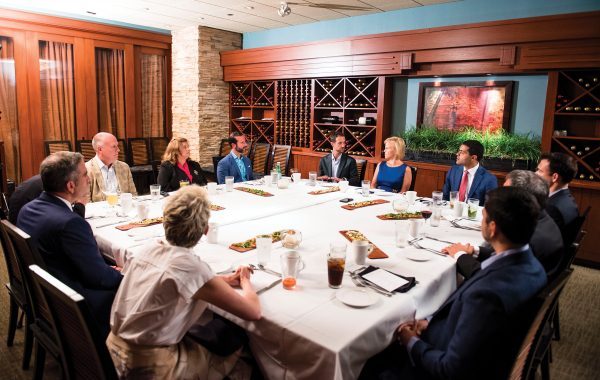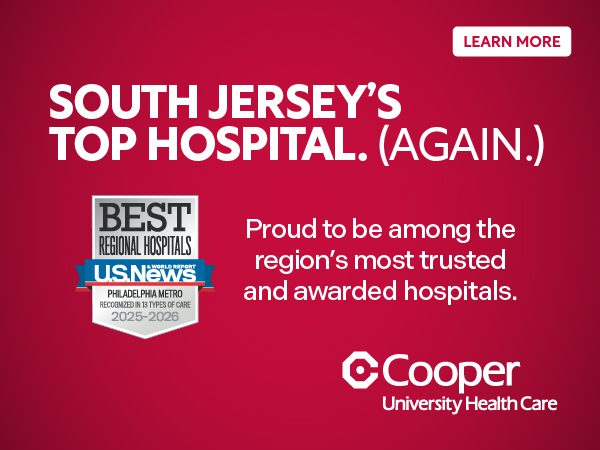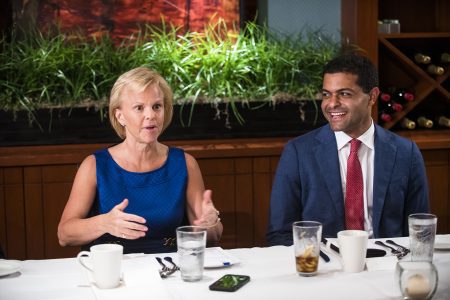 PHOTOS BY DAVID MICHAEL HOWARTH at SEASON’S 52
PHOTOS BY DAVID MICHAEL HOWARTH at SEASON’S 52
We chose a vitally important and somewhat controversial topic as we continue our popular roundtable series: medical marijuana. The issues surrounding this timely subject are complex, so it was important to have experts at the table who could speak knowledgeably and openly, which they did. The conversation was eye-opening, shedding light on a topic that everyone has an opinion on, even though they may not understand it. What follows are important notes on a medical treatment that some consider life-changing, while others consider it illegal – and immoral.
Todd Rinnieri, DO
Team Management Specialist, Relievus
Peter Rosenfeld
Board Member, Coalition of Medical Marijuana New Jersey
Stephen Goldfine, MD
Chief Medical Officer, Samaritan Healthcare and Hospice
Shereef Elnahal, MD
N.J. Health Commissioner
Ed. Note: At the time of the roundtable, Dr. Elnahal was the N.J. Health Commissioner. He has since left the position.
Matthew Lesneski, MD
Medical Director, Releaf Alternative, Chief Development Officer, ReclaimAbility Pain Services
Bill Caruso
Managing Director, Archer Public Affairs Co-chair, Cannabis practice, Archer
Burhan Haleem, DO
CFO/Medical Dir. Washington Twp., ReclaimAbility Pain Services
Mike Sabia
Division Head, Cooper Pain Management
Joe Savon, MD
Medical Director, New Life Medical Detoxification
Lora Barbour
Parent Advocate
Ekaterina Sedia
Associate Professor of Biology
Coordinator, Cannabis Studies Minor, Stockton University
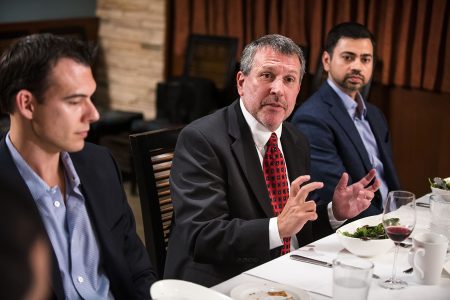 Caring for patients…
Caring for patients…
It’s our job as the physician to educate patients on the many different applications for medical marijuana: there’s tinctures, oils, topicals, inhalation, vaping, medical foods and lozenges. Sometimes the patient is eager to get relief from their pain, but they’re worried they have to hide in the garage and smoke a joint or vape. They don’t realize that some other applications may work, like the topical oil or the lozenges.
Mike Sabia
The recreational user and the medical patient want the total opposite. Patients want no high, recreational users want all high. As doctors, we try to educate the patient on how to use this. And the message is: go low and slow.
Todd Rinnier
Because my patients are so sick – they’re getting active chemotherapy – a lot of them come to me looking for medical marijuana. The thinking is, “I need to get through this treatment, because if I don’t, I’m going to die.” They’re willing to try almost anything so they don’t die. This is all anecdotal, but I’ve had patients who have been able to stay in treatment for a longer period of time. I have a lot of patients that are in maintenance chemotherapy who are doing well beyond what anyone thought they would do. They don’t do well forever, but they do have a better quality of life, and that’s really the ultimate goal.
Stephen Goldfine
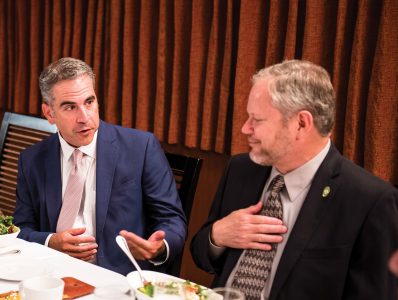 The process of getting medical marijuana…
The process of getting medical marijuana…
When a doctor certifies you, you send in paperwork to the state for review. In about two to three weeks, you will get an email if you’re approved, that says, “Hey, you’ve got to pay for your marijuana card.” Once you receive your card, you can go to a dispensary. At the dispensary, you’ll explain your symptoms, and they’ll educate you on what they have that may help.
We come up with treatment goals and a plan for a three-month interval. Then we see if you’re meeting your goals. If not, we work on the nuances of what you are using, and talk about if there is any progress. That’s where we get into the art of helping the patient manage it themselves, because I can’t prescribe it. I can recommend it. So I help guide the patient.
Matthew Lesneski
The stigma…
When I talk with a patient about medical marijuana, it immediately segues into this personal struggle. They know they might be helped, but they don’t want anybody to know because they may be judged. It’s an emotional roller coaster.
Mike Sabia
There is no other drug – including opioids – where you must see a specific specialist before you can get it, which was the requirement for children needing medical marijuana. They needed a psych evaluation. I could prescribe opioids to a child without the need for a psych evaluation. By the way, it can take weeks, sometimes months, if you’re lucky, to see a child psychiatrist in New Jersey. This was created because of the stigma behind the issue, and a fear that people would take advantage of it. But we were able to get rid of that through rule changes. Parents with children who need it have come to us saying this has been the best thing we’ve done.
Shereef Elnahal
I think the stigma is changing. I think people are starting to see, anecdotally, profound benefits for patients, so they’re willing to take some risks. But it’s still not perfect. There are a lot of broken holes in the system.
Bill Caruso
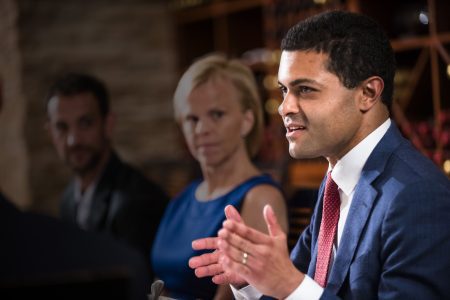 Medical marijuana myths…
Medical marijuana myths…
A lot of folks think patients tend to be on the younger side. Not true at all. The age of patients mirrors the age of people with chronic disease and real health problems. So the most common age is middle-aged to senior citizen. The minority are folks in their 20s and younger.
Shereef Elnahal
Patients say, “Oh, I tried it once and it made me paranoid.” Well, there are many strains, and each one works in a different way. So when you’re 16 trying this and worried about getting caught, it’s a lot different than a doctor recommending it for you.
Todd Rinnier
The biggest misconception is that you get high if you use medical marijuana, which is not entirely true. Every strain is different, every patient responds differently.
Mike Sabia
As a pain physician, every drug we prescribe has side effects, some of them very significant. So it is nice knowing, as a physician, that I’m not likely to cause harm with this pain treatment. I could with a lot of other treatments we use.
Matthew Lesneski
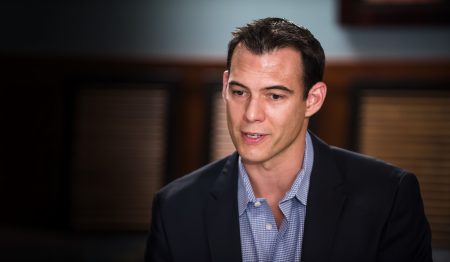 The cost…
The cost…
An ounce is about $400. There’s a lot of trial and error to find the right dose, so patients try a strain or two and discover it doesn’t work. They’ve already spent $400, so they have to stop. I almost did, it took me so long to really find the strains that worked for me.
Peter Rosenfeld
We should be able to bill insurance companies for this. The cash business that’s happened around medical marijuana is not an ethical moment for us. We shouldn’t get to a point where we have marijuana shops, if you will, where you’re going every three months and paying $400. That is not helping our patients.
Stephen Goldfine
Think about this: For no other drug do you say, “I’m going to make an appointment to get Lipitor.” You make an appointment because you’re not feeling right, and you get a diagnosis of hypertension, and that’s what is billed to the insurance company. But you can’t do that for people who need medical marijuana.
Shereef Elnahal
The good news is: For worker’s comp plans, insurance companies are starting to realize it’s cheaper to treat pain with cannabis rather than opioids. They can get people back to work quicker and without addiction issues. We’re starting to see Medicaid and Medicare examine this from a cost-savings side. And some private payers are now in. This isn’t going to happen tomorrow, but massive changes are coming.
Bill Caruso
I just had a patient tell me, “I went to the medical marijuana dispensary and tried 20 different strains until I found the right one for me. It doesn’t get me high. It gives me pain relief, and I can go about my day.” But it cost him a lot, which he could afford, but not everybody has that luxury.
Todd Rinnier
The lack of research…
The lack of research is definitely an issue. This is a plant that produces many chemicals, and we know about some of them, but we have no idea what they do individually or how they work together. So we not only don’t know much about what it does, but we also don’t know what exactly in the plant is effective.
Ekaterina Sedia
A lot of what we’ve learned has been through anecdotal evidence here in our country. We have tremendous opportunities to develop more research in this area, but most of the good research is off-shore, in other countries. There are a lot of unanswered questions about what medical marijuana does – and doesn’t – help with.
Bill Caruso
One of the main problems we have is that I can’t tell you what dose will work for you. We will make a huge mistake if we don’t conduct medical research. It can’t become snake oil. Our state has the opportunity and the infrastructure to make marijuana medical. Then, years down the line, as a physician I can say, “Well, this has been proven to work at this dose.” Now I just talk about the safety and the side effects of it, and I coach patients on what to do.
Matthew Lesneski
We need the federal government to remove marijuana from schedule 1 status, which, by definition, says there’s no medicinal application for the drug. When that happens, a chain reaction will occur: Federal research dollars will go to funding studies. More doctors and more health professionals will buy into prescribing it if they have research behind it. The FDA can accept submissions for approval. When it’s approved, more physicians will choose to use it. And then finally, insurance will choose to cover it because it’s FDA approved.
Shereef Elnahal
The benefits…
PTSD is one of the best conditions for medical marijuana. That vet who has nightmares and can’t function during his day, medical marijuana, if consumed or smoked nightly, reduces memories, reduces dreams, so they wake up without remembering a nightmare. Those patients are wildly better by using this on a daily basis.
Todd Rinnier
I just did a home visit with an 85-year-old patient, and she takes one vape in the morning, one vape at night and her Parkinson’s is better. She can move around her house. Again, is it placebo? Is it “I feel better, my anxiety is better, I’m not afraid of falling?” Maybe it’s all of those things, but we don’t know, because the data just isn’t there. But she does great.
Stephen Goldfine
On the future…
Medical professionals are joining forces, they’re gaining momentum. Patients are being their own advocates and lobbying. All that is getting more public attention, and people are becoming more aware of the need. We just have to sit back and see how we, as the pioneers, can help push this through.
Mike Sabia
The real breakthrough is going to be when the federal government reschedules marijuana to schedule 2. I think New Jersey is actually positioned to be a major research state, so I’m expecting at that point to see New Jersey go to the forefront of research for medical marijuana.
Peter Rosenfeld
We’re starting to see this light at the end of the tunnel. We all talk about the need for federal reform, and it’s actually happening. We’re seeing bills move out of committees in Congress, for the first time, on banking reform. There’s been conversations through the Defense Appropriations Act about coverage on the VA level; real honest-to-goodness discussions going on across the aisle. It now becomes a question of when, not if, this happens.
Bill Caruso
An alternative to opioids
Long-acting opioid medications, like morphine, can completely zonk you out. You’re in a haze constantly. Medical marijuana helps deal with pain without having that haze. For someone to be active and go back to school and go back to work, this is life-changing.
Burhan Haleem
This past January, New Jersey added opioid use disorder as an independent condition for medical marijuana. This is different from recommending medical marijuana in lieu of opioids for chronic pain. If someone has opioid use disorder, they can take medical marijuana as part of their treatment, as long as it is an adjunct to medication-assisted treatment.
Shereef Elnahal
When you compare medical marijuana to opioids and other drugs we prescribe on a daily basis, it’s a no-brainer. Nobody’s ever died, the side effects are low, the benefits are high. I don’t see why you wouldn’t do it.
Todd Rinnier
To those who oppose medical marijuana…
A lot of people say this is a gateway drug. But the cannabis is not the gateway drug, abuse is the gateway drug, trauma is the gateway drug, misery, isolation, pain, all of those things – they are the conditions that lead people to self-medicate with a variety of substances.
Ekaterina Sedia
Even if you’re not for it, you shouldn’t be against it. There might be a time where you or one of your loved ones will need it, and it will be here for you. That’s what we’re fighting for.
Bill Caruso
I understand the skepticism. Two years ago, if you’d asked me about medical marijuana, I would have hesitated. But I’ve seen so many patients benefit from it. How can you be against it?
Burhan Haleem
There is so much underperformance in the medical profession. Maybe it makes sense to have an open mind to options.
Joe Savon
The CBD aisle you see in the supermarket…
That’s not marijuana. Marijuana is the flower of the plant, and hemp is the other part of the plant. Those products are hemp-based, so it’s different. That has to be grown in states that have the federal authority to do so.
Shereef Elnahal
Those products are not regulated, so you don’t know what’s in that stuff. There could be a little CBD, there could be a lot.
Peter Rosenfeld
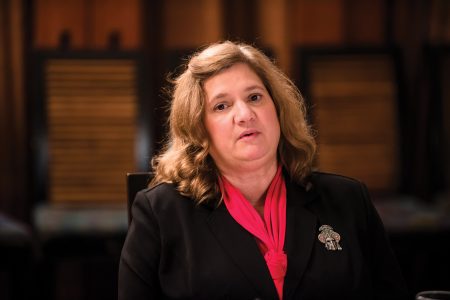 Lora Barbour shared the incredible story of how medical marijuana has helped her daughter, and how difficult it has been to get it for her.
Lora Barbour shared the incredible story of how medical marijuana has helped her daughter, and how difficult it has been to get it for her.
My daughter, Jenevieve, is 20 now. She’s had seizures her whole life. They started when she was 3 months old. It was infantile spasms, which doesn’t sound horrible, but it is. It comes with mental retardation, and it’s just devastating. She continued to seize every hour during the day, every two hours at night. At 2, she went in for brain surgery.
We eventually did a trial with medical marijuana at a hospital, and things were better for her. But even though she was better, she still had some seizures, so they stopped the treatment. At that point, I told them I was going to do it on my own. They said, “You can’t.” I said, “Yes, I can.”
The other medicines she was on would destroy her. One made her throw up. Another made her drool. She couldn’t walk.
We had to jump through a lot of hoops, but I got her certified in New Jersey. It was quite hard, but we did it. My primary doctor literally wrote a note that I carried with me that said these parents are not abusive to this drug, their daughter is handicapped and might benefit from this.
It’s been really hard, because she’s non-verbal. If she could talk to me and I could fine-tune the dose, I’d be much better off. I’m still tweaking her dose right now. I have her down to the lowest amount, and she’s off 70-75% of her medicines right now. That’s huge. I don’t have complete control, but I have a much better child.
So even though she still has seizures, I will continue to do this because her quality of life is better.
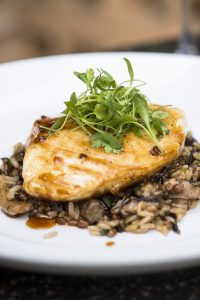 MENU
MENU
Seasons 52
Appetizer
Roasted Corn, Aged Cheddar and Spiced Bacon Flatbread
Pesto Chicken & Fresh Mozzarella Flatbread
Salad
Seasonal Spinach & Roasted Broccoli
Entrée
(choice of)
Cedar Plank Roasted Salmon
Pot-Roasted Basil-Ricotta Chicken
Dessert
Assorted Mini Indulgences


